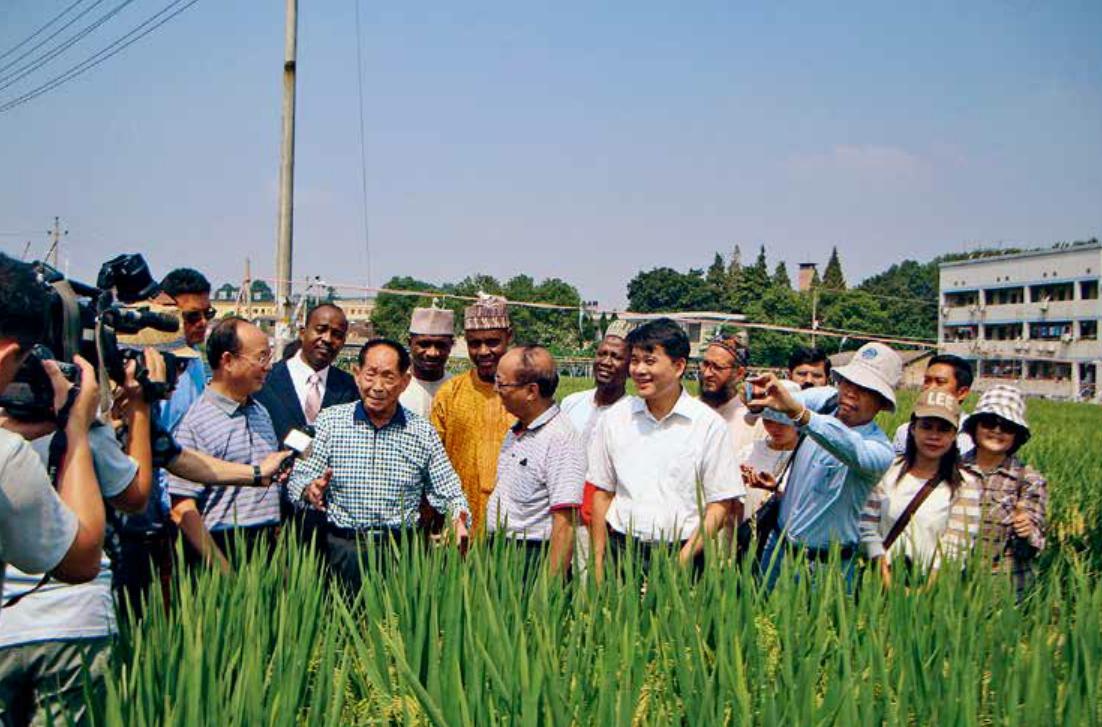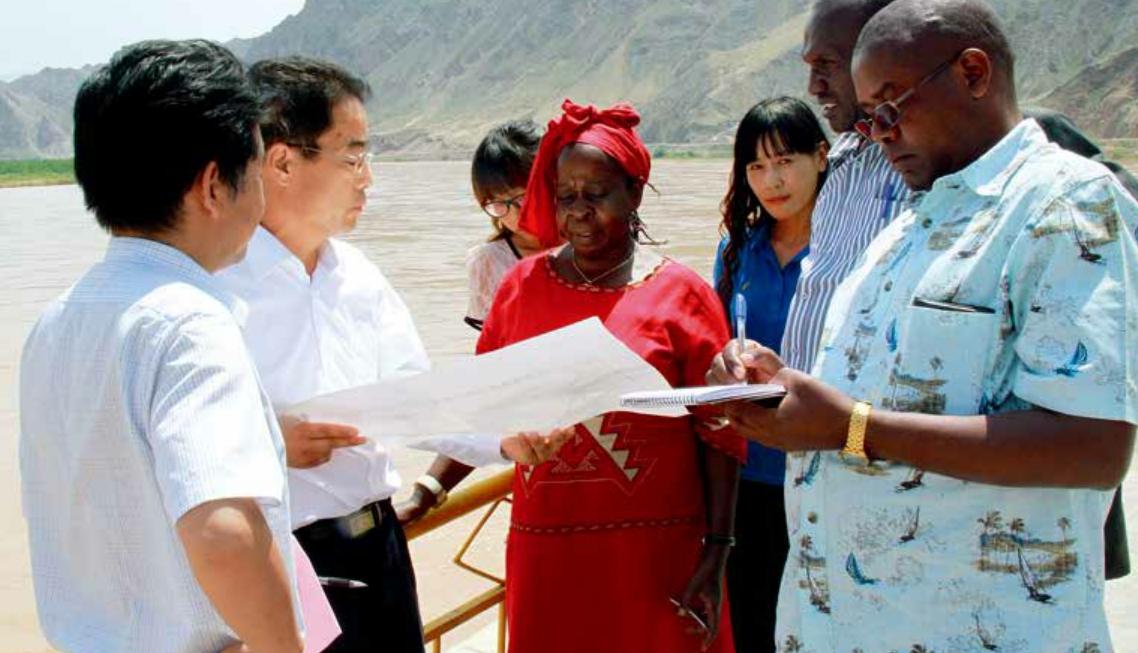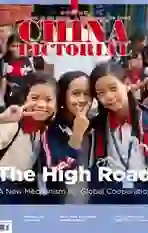Connecting China with the World
2019-05-06byGongHaiying
by Gong Haiying
“Im so excited to finally visit the birthplace of hybrid rice where Academician Yuan Longping, the father of hybrid rice, works and lives,” exclaimed Amir Anchalee Prasertsak, a senior expert of the Rice Department at Thailands Ministry of Agriculture and Cooperatives. In June 2009, she arrived at the Hunan Rice Research Institute (HRRI) for a training class for developing countries on hybrid rice technology, and her sentiments mirrored those of every arriving trainee.
Huang Zhicai, deputy director of the HRRI, noted that the training classes have not only promoted the globalization of hybrid rice technology and contri buted Chinese efforts in maintaining world food security, but also greatly enhanced the friendship between China and other developing countries and laid a solid foundation for enhancing peopleto-people connectivity through the Belt and Road Initiative. “We have become close friends and established deep connections with many foreign students taking training classes,” he said.
Nation Training
Hybrid rice originated in central Chinas Hunan Province. Since its establishment in 1975, the HRRI has cultivated many new varieties of rice of high quality and made significant breakthroughs in planting techniques.
In 2009, the institute began to hold training classes to teach hybrid rice cultivation technology with independent intellectual property rights to students from developing countries.
Since the launch of the Belt and Road Initiative, the institute has established cooperation with an increasing number of developing countries along the Belt and Road routes and trained more than 150 hybrid rice technicians for nearly 20 countries. To guarantee the effectiveness of the training classes, instructors developed targeted courses for trainees from various regions such as instruction on unique application of hybrid rice technology in tropical areas for African students, mechanized seedling production and cultivation courses for South American students, and rice quality improvement courses for Southeast Asian students.
Thanks to the help from two Brazilian trainees in the first training classes, the HRRI conducted in-depth cooperation with some organizations in Brazil from 2010 to 2012. Within those three years, the institute and its Brazilian partners jointly studied mechanized seedling production technology and developed two new rice varieties suitable for plantation in Brazil. Compared to traditional varieties, the hybrid rice invented by the cooperation program has improved its yield by about 50 percent, which is widely welcomed by local farmers.
Since the introduction of the Belt and Road Initiative, the institute has strengthened its ties with involved developing countries. In recent years, it has been placing particular emphasis on cooperation with partners in Thailand and Laos.
From 2013 to 2018, China and Thailand sent 24 and 21 experts respectively to visit each other for exchange studies. From 2013 to 2016, the institute undertook two major technical cooperation projects on hybrid rice with the Rice Department of Thailands Ministry of Agriculture and Cooperatives.
In 2018, the institute began to send experts to conduct technical cooperation with organizations in Laos on rice breeding. Huang revealed that more cooperation would be conducted with the country in the years to come.
Huang recalled that at first many students from developing countries knew little about hybrid rice
technology. Over the past 10 years, however, many former trainees have effectively solved many technical problems in rice breeding in their own countries with the technology they learned at these training classes. Such success has inspired them to strongly recommend the classes to their colleagues and friends from home and abroad alike. Now, an increasing number of people are applying for the training program.
Academician Yuan Longping is the brightest star of the program.“Almost every trainee expects to meet him whenever they sign up for training,” Huang grinned. As honorary director of the institute, Yuan insists on providing training lessons in person no matter how busy he is and sometimes takes students into the field to show them the new research results on super hybrid rice.
Boosting Belt and Road Cooperation
To date, the technical training classes for developing countries sponsored by Chinas Ministry of Science and Technology have been carried out for 30 consecutive years.
Training courses cover many fields such as science and technology policy and management, agricultural technology, information and manufacturing, healthcare, resources and environmental protection. They aim to help developing countries train technical personnel, develop advanced and applicable technologies and promote the technological, economic and social development in those countries.
For example, the International Training Class on Railway Construction Technology sponsored by China Railway Eryuan Engineering Group Co., Ltd., the only technical training class in the field of transportation, has been held for four straight years since 2015, during which time it has provided railway technology training courses for nearly 100 trainees from 15 countries and regions. Training courses are delivered in various forms including theoretical teaching, technical exchange, field surveys and cultural visits to comprehensively share the achievements and experiences of Chinas railway development.
Some training courses have even gone global. After holding five training classes in Chongqing, a municipality in southwestern China, Chongqing Medical University opened classes in Cairo, Egypt in 2018.
How can people-topeople connectivity be strengthened more effectively through such training classes? In the International Training Workshop on Southeast and South Asian Science Parks sponsored by the Ministry of Science and Technology in 2018, a one-to-one mentoring system was innovatively adopted. Chinese experts provided individualized tutoring for each trainee according to the actual conditions of his or her country and discussed the feasibility of construction of science parks and international cooperation in the country, which was widely acclaimed.
With the implementation of Chinas Belt and Road Science, Technology and Innovation Cooperation Action Plan, we can see that technical training classes are playing an increasingly important role in deepening scientific and technological exchange.
According to Minister Wang Zhigang, the Ministry of Science and Technology organized more than 500 young scientists from countries participating in the Belt and Road Initiative to carry out short-term scientific research in China in 2018, and technical training classes for developing nations recruited more than 1,200 students from relevant countries.
International students from developing countries have played the role of “innovation messengers” while promoting people-to-people connectivity, connecting China with the world and jointly progressing toward a better future for mankind.
